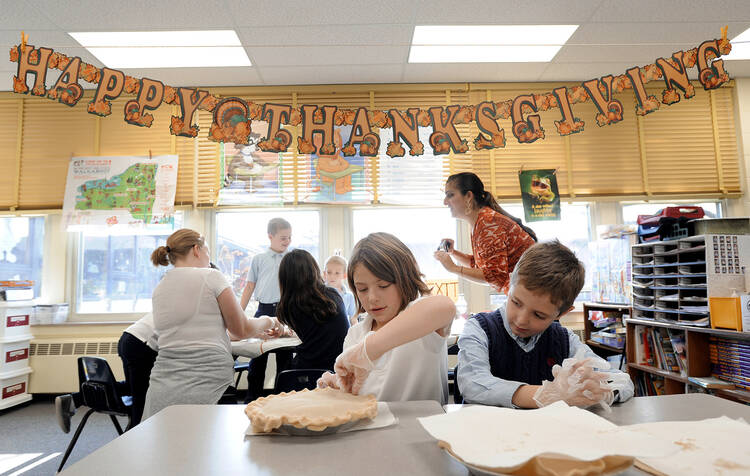Thanksgiving is becoming more and more a celebration of overconsumption—and not just of stuffing and pie, though there is still plenty of that. Major retailers chip away at the holiday by merchandising creep—opening doors to deal-hungry shoppers on Thursday evening or even earlier in the day, as many retailers have begun to do during the past decade. The shift from gratitude and thanksgiving to full-blown mall madness demeans the day.
It was not always so. Some recollection of the origins of Thanksgiving might help us to renew this wonderful, truly American “holy day.”
In 1863, in the midst of the horrendous Civil War, Abraham Lincoln made Thanksgiving a national holiday, calling in his proclamation for “humble penitence for our national perverseness and disobedience.” He urged repentance, a turning back to God, as well as gratitude for God’s bounty. Under Lincoln’s inspiration, a renewed Thanksgiving could be a time for families and communities to take stock. How have we discerned and acted on the grace of God in our lives this past year? What drives our lives? Is it of God?
President Lincoln also recommended that prayers include a petition “to commend to God’s tender care all those who have become widows, orphans, mourners or sufferers in the lamentable civil strife.” Care for the vulnerable is at the heart of the message of Jesus, which Lincoln had absorbed and practiced, although he was not an adherent of any religious denomination.
How might we reach out today—personally and civically—to families who mourn the loss of a spouse, son or daughter killed in war, to veterans suffering the perduring effects of war, to refugees displaced by war and immigrants seeking a livelihood and hope? Can we welcome them all to the bountiful table of Thanksgiving? Many families invite an elderly widow or an international student away from home or persons “down on their luck” to a Thanksgiving dinner. Many others work in a shelter or in a church to provide a Thanksgiving meal for the homeless. Food and hospitality are the theme. This is as it should be. No one in this country, no one anywhere, should go hungry.
Lincoln also urged his fellow citizens to “fervently implore the interposition of the Almighty Hand to heal the wounds of the nation and to restore it as soon as may be consistent with the Divine purposes to the full enjoyment of peace, harmony, tranquility and union.”
Pondering Lincoln’s pro-clamation draws us deeper into the meaning of the day. Certainly widespread suffering caused by the unjust U.S. war in Iraq invites us to repentance. And we are still engaged in another war, seemingly endless, in Afghanistan with the prospect of perpetual engagement with terrorism elsewhere. The issues are so complex, the anger so ancient and the religious understandings so diverse that it sometimes seems as if only the Almighty can cut through the morass and bring peace: God’s peace.
The even earlier, mostly legendary history of Thanksgiving reminds us that we are all pilgrims, people on the way, sometimes strangers in a strange land, reliant on the good will and compassion of others.
The Plymouth settlers, who celebrated the first thanksgiving feast in America, were fleeing religious persecution in their native England when on Sept. 6, 1620, they set sail for the New World. The long trip was cold and damp, and because of the danger of fire on the wooden ship, food had to be eaten cold. Rather improvidently, the Puritans landed in December in a wintry, harsh, rocky landscape. The first winter was devastating, with exceptionally heavy snow and sleet. Only 50 of the more than 100 settlers and crew survived it.
Then in March, as the story has it, some native people stepped in to rescue them. An Indian man named Squanto, who spoke English because he had been captured by a ship captain and taken to Europe years before, taught the colonists how to tap the maple trees for sap and how to plant corn, burying decaying fish with the seeds to fertilize them. By October the newcomers had corn in abundance, fruits and vegetables, fish packed in salt, meat cured over smoky fires—and most of all, newfound friends. Gov. William Bradford of Plymouth invited the Indians to join them in feasting, which lasted three days.
The maw of consumerism threatens to swallow up the historical and spiritual meaning of Thanksgiving unless we can resist the merchandising agents, at least for a day. More positively, we can simply ignore the sales, join in interfaith celebrations, volunteer in shelters and churches to make certain the poor or the homeless have a special dinner and then join our families around tables of abundance in gratitude to God.








